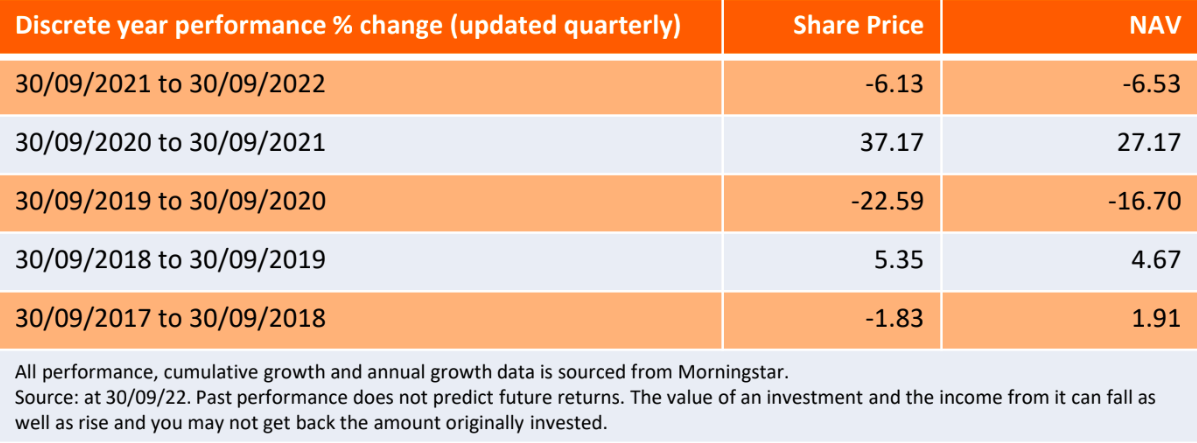
Investment Environment
In the UK, the FTSE All Share Index fell by 5.9% as concerns over a slowing economy and government plans to cut taxes unnerved investors.¹ The government tax proposal, announced only weeks after Liz Truss was appointed prime minister, caused disorder in the UK bond market, and pushed sterling to a record low against the US dollar. Government bond yields initially surged in response to the “mini-budget” over fears that the tax cuts were unfunded, but the move was further exasperated by pension funds becoming forced sellers of gilts to raise collateral given the unprecedented falls in government bond prices resulted in margin calls within their Liability Driven Investment funds (LDI). This prompted the Bank of England (BoE) to announce a £65 billion emergency plan to provide financial stability and halt dislocation in the UK bond market.²
The FTSE 100 Index (down 5.2%), significantly outperformed FTSE 250 (down 9.7%) and FTSE Small Cap (down 7.2%) indices. Consumer staples and energy outperformed during the month, while cyclical sectors such as financials, real estate, and consumer discretionary, underperformed, along with utilities. The UK 10-year gilt yield rose to 4.1% over the month from 2.8% as at the end of August.¹
Portfolio Review
The Company’s net asset value (with debt at fair value) fell 8.7% during September, underperforming the FTSE All share (80%) & ICE BofA Sterling Non-Gilts (20%) benchmark’s fall of 6.4%.¹ Disappointing performance within the equity portfolio and the negative impact of gearing were the main detractors of performance.
Within the equity portfolio, the position in Hilton Food Group detracted from returns. The company announced disappointing results as a significant rise in raw material costs, which it was unable to pass on to its customers, impacted profitability.³ Holdings in buy-to-let lender Paragon and housebuilders Persimmon and Vistry were also detrimental to performance. The spike in bond yields fed through to much higher fixed rate mortgage offers from banks which prompted fears that this would cause a significant slowdown in the housing market. With the dislocation in the bond markets and weak equity market backdrop, the investment company’s positions in financials, Intermediate Capital, Phoenix, and M&G all negatively impacted performance. Elsewhere, the positions in Burberry and RELX aided performance. The announcement of Daniel Lee as Burberry’s new Creative Director was well received, while RELX outperformed as investors sought out its historically defensive earnings.
During the month, we initiated a new position in Spectris, which develops precision instrumentation and controls for various industries. The company has a strong franchise in specialist niche markets while the valuation, in our view, didn’t fairly reflect the increase in quality of the business following the recent sales of lower growth and lower margin businesses.
Manager Outlook
The economic environment is the most challenging it has been for several years. It is likely that the increase in interest rates that most central banks have undertaken to control inflation will lead to subdued economic growth, and potentially a recession in many countries. This is likely to result in earnings downgrades across a variety of sectors, with demand falling and costs rising. That said, there has already been meaningful weakness across markets, and employment and the financial system are in much better health than at the start of previous slowdowns.
Throughout the year we have been lowering gearing and increased the investment company’s bond exposure. The equity portfolio has a bias towards defensive and more resilient businesses. Where there is cyclical exposure, it is generally in high-quality businesses or where the valuation is already discounting a too bearish economic outcome in our view.

¹Source: Bloomberg as at 30 September 2022.
²Source: https://www.ft.com/content/756e81d1-b2a6-4580-9054-206386353c4e
Bond yields – Bond yield is the return an investor realizes on a bond and can be derived in different ways.
Cyclical stock – Companies that sell discretionary consumer items, such as cars, or industries highly sensitive to changes in the economy, such as miners. The prices of equities and bonds issued by cyclical companies tend to be strongly affected by ups and downs in the overall economy, when compared to non-cyclical companies.
Defensive stock – A defensive stock is a stock that provides consistent dividends and stable earnings regardless of the state of the overall stock market. There is a constant demand for their products, so defensive stocks tend to be more stable during the various phases of the business cycle.
Gearing – Gearing is the measure of a company’s debt level. It is also the relationship between a companies leverage, showing how far its operations are funded by lenders versus shareholders. Within investment trusts it refers to how much money the trust borrows for investment purposes.
Liability Driven Investments – A liability-driven investment, otherwise known as liability-driven investing, is primarily slated toward gaining enough assets to cover all current and future liabilities. This type of investing is common when dealing with defined-benefit pension plans because the liabilities involved quite frequently climb into billions of dollars with the largest of the pension plans.
Net Asset Value (NAV) – The total value of a fund’s assets less its liabilities.